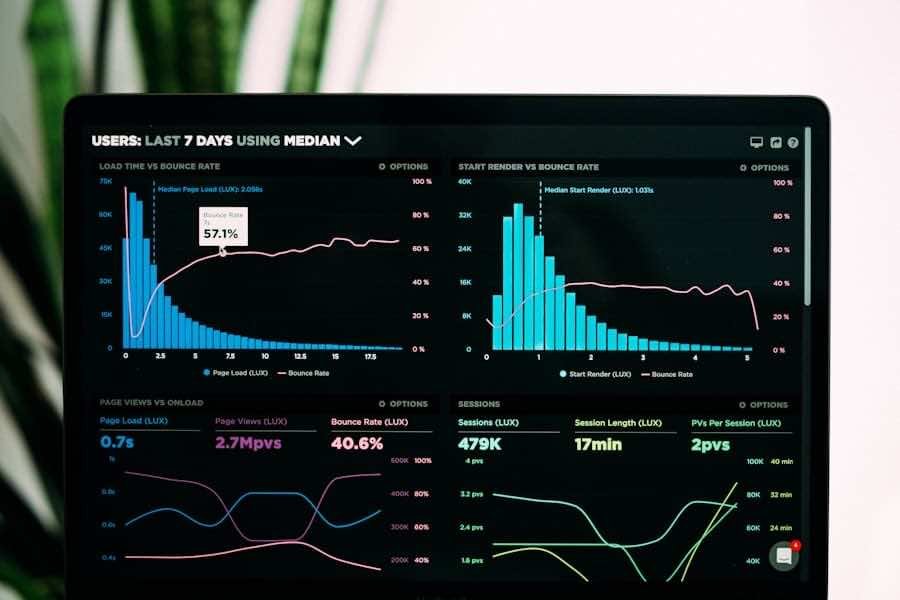The Internet of Behaviour (IoB) is an emerging concept that encapsulates the intersection of technology, data analytics, and human behaviour. It refers to the collection and analysis of data generated by individuals’ interactions with digital platforms, devices, and services, which in turn influences their behaviours and decision-making processes. As the digital landscape continues to evolve, the IoB has gained prominence, particularly with the proliferation of smart devices and the increasing sophistication of data analytics.
This phenomenon is not merely a technological advancement; it represents a paradigm shift in how businesses and organisations understand and engage with consumers. At its core, the IoB leverages vast amounts of data collected from various sources, including social media, online transactions, and even physical interactions through smart devices. This data is then analysed to discern patterns and trends in consumer behaviour, allowing organisations to tailor their offerings more effectively.
The implications of IoB extend beyond marketing; they touch on various aspects of daily life, from healthcare to public services. As we delve deeper into this topic, it becomes evident that the IoB is reshaping our understanding of human behaviour in the digital age.
Summary
- The Internet of Behaviour (IoB) is a concept that focuses on the collection and analysis of data to understand and influence human behaviour.
- Data plays a crucial role in shaping behaviour, and the IoB aims to leverage this connection to drive targeted actions and decisions.
- IoB raises concerns about personal privacy and data security, as the collection and use of personal data becomes more pervasive.
- IoB is transforming marketing and consumer behaviour by enabling businesses to understand and predict consumer actions and preferences more accurately.
- Artificial intelligence and big data are essential components of IoB, enabling the processing and analysis of vast amounts of behavioural data to derive meaningful insights.
Understanding the Connection Between Data and Behaviour
The relationship between data and behaviour is intricate and multifaceted. Data serves as a mirror reflecting individual actions, preferences, and tendencies. By analysing this data, organisations can gain insights into what drives consumer choices, enabling them to predict future behaviours with remarkable accuracy.
For instance, e-commerce platforms utilise algorithms that track user interactions—such as clicks, purchases, and time spent on specific pages—to create personalised shopping experiences. This not only enhances user satisfaction but also increases conversion rates, demonstrating how data can directly influence consumer behaviour. Moreover, the connection between data and behaviour is not limited to commercial applications.
In social contexts, platforms like Facebook and Twitter analyse user interactions to curate content that aligns with individual interests. This creates a feedback loop where users are continually exposed to information that reinforces their existing beliefs and preferences. Such dynamics can lead to phenomena like echo chambers, where individuals are less likely to encounter diverse viewpoints.
Understanding this connection is crucial for organisations aiming to harness the power of IoB while being mindful of its broader societal implications.
The Impact of IoB on Personal Privacy and Data Security

As the IoB continues to expand, concerns regarding personal privacy and data security have become increasingly pronounced. The extensive collection of behavioural data raises critical questions about consent and ownership. Individuals often unwittingly share vast amounts of personal information through their online activities, which can be harvested and analysed without their explicit knowledge.
This lack of transparency can lead to a sense of vulnerability among consumers, who may feel that their privacy is compromised in an age where their behaviours are meticulously tracked. Furthermore, the security of this data is paramount. High-profile data breaches have highlighted the risks associated with storing sensitive information in digital formats.
When organisations fail to implement robust security measures, they expose individuals to potential identity theft and other cybercrimes. The challenge lies in balancing the benefits of IoB—such as enhanced user experiences and targeted services—with the imperative to protect personal information. As regulatory frameworks evolve to address these concerns, organisations must adopt ethical practices that prioritise consumer trust while leveraging behavioural data for innovation.
How IoB is Revolutionizing Marketing and Consumer Behaviour
The impact of IoB on marketing strategies cannot be overstated. Traditional marketing approaches often relied on broad demographic categories to target consumers; however, the IoB enables a more nuanced understanding of individual preferences and behaviours. By analysing data from various touchpoints—such as online browsing history, social media interactions, and purchase patterns—marketers can create highly personalised campaigns that resonate with specific audiences.
This level of customisation not only enhances engagement but also fosters brand loyalty. For example, consider a streaming service that uses IoB principles to recommend content based on a user’s viewing history and preferences. By analysing what genres a user enjoys or which shows they binge-watch, the platform can suggest new titles that align with their tastes.
This tailored approach not only improves user satisfaction but also increases the likelihood of continued subscriptions. As businesses increasingly adopt IoB strategies, they are not only transforming their marketing efforts but also redefining consumer expectations regarding personalised experiences.
The Role of Artificial Intelligence and Big Data in IoB
Artificial Intelligence (AI) and Big Data are integral components of the Internet of Behaviour, driving its capabilities and applications across various sectors. AI algorithms are adept at processing vast datasets quickly and efficiently, enabling organisations to extract meaningful insights from complex behavioural patterns. Machine learning models can identify correlations between different variables—such as time spent on a website and likelihood to purchase—allowing businesses to optimise their strategies in real-time.
Big Data complements AI by providing the sheer volume of information necessary for accurate analysis. The ability to collect and store massive amounts of behavioural data from diverse sources empowers organisations to make informed decisions based on empirical evidence rather than intuition alone. For instance, retailers can analyse foot traffic patterns in physical stores alongside online shopping behaviours to create a cohesive omnichannel strategy that enhances customer experience.
The synergy between AI and Big Data within the IoB framework is revolutionising how organisations operate, paving the way for more intelligent decision-making processes.
IoB in Healthcare and Public Services

The application of IoB principles extends beyond commercial enterprises; it holds significant potential in healthcare and public services as well. In healthcare settings, patient data collected from wearable devices can provide invaluable insights into individual health behaviours. For instance, fitness trackers monitor physical activity levels, sleep patterns, and heart rates, allowing healthcare providers to tailor interventions based on real-time data.
This proactive approach not only enhances patient outcomes but also encourages individuals to take charge of their health. Public services can also benefit from IoB by utilising behavioural data to improve service delivery. For example, city planners can analyse traffic patterns and public transport usage to optimise routes and schedules based on actual demand rather than assumptions.
This data-driven approach leads to more efficient resource allocation and improved public satisfaction. As governments increasingly embrace IoB principles, they can create smarter cities that respond dynamically to the needs of their citizens.
Ethical and Legal Considerations of IoB
The rise of the Internet of Behaviour brings forth a myriad of ethical and legal considerations that must be addressed as society navigates this new landscape. One pressing concern is the issue of consent; individuals often lack a clear understanding of how their data is being collected and used. This ambiguity raises ethical questions about whether organisations are adequately informing consumers about their data practices and obtaining informed consent.
Additionally, the potential for misuse of behavioural data poses significant risks. For instance, targeted advertising can easily cross ethical boundaries if it exploits vulnerable populations or manipulates individuals into making decisions against their best interests. Legal frameworks are evolving to address these challenges; however, there remains a need for comprehensive regulations that protect consumers while fostering innovation in the IoB space.
Striking this balance will require collaboration between policymakers, businesses, and civil society to ensure that ethical considerations are at the forefront of IoB development.
The Future of IoB and its Potential Developments
Looking ahead, the future of the Internet of Behaviour is poised for remarkable developments as technology continues to advance at an unprecedented pace. One potential trajectory involves the integration of IoB with emerging technologies such as augmented reality (AR) and virtual reality (VR). These immersive experiences could provide even deeper insights into consumer behaviour by capturing real-time reactions in dynamic environments.
For instance, retailers could use AR to create virtual shopping experiences that adapt based on user interactions. Moreover, as consumers become more aware of their digital footprints, there may be a growing demand for transparency and control over personal data. This shift could lead to the emergence of new platforms that empower individuals to manage their own behavioural data while still benefiting from personalised services.
The evolution of IoB will likely be characterised by a continuous dialogue between technological innovation and ethical considerations, shaping a future where data-driven insights enhance human experiences without compromising individual rights. In conclusion, the Internet of Behaviour represents a transformative force across various sectors, influencing how organisations engage with consumers while raising critical questions about privacy, ethics, and security. As we navigate this complex landscape, it is essential for stakeholders to remain vigilant in addressing these challenges while harnessing the potential benefits that IoB offers for society at large.
If you are interested in learning more about the impact of technology on various industries, you may want to check out this article on fintech. Fintech is a rapidly growing sector that is revolutionising the way we handle financial transactions. Just like the Internet of Behaviour (IoB) is changing the way businesses interact with consumers, fintech is reshaping the financial services industry. By exploring both topics, you can gain a better understanding of how technology is shaping the future of business.
FAQs
What is the Internet of Behaviour (IoB)?
The Internet of Behaviour (IoB) is a concept that involves the use of data from various sources, such as social media, internet browsing, and location tracking, to influence and change human behaviour.
How does the Internet of Behaviour work?
The Internet of Behaviour works by collecting and analysing data from various sources, such as social media, internet browsing, and location tracking, to gain insights into human behaviour. This data is then used to influence and change human behaviour through targeted interventions and personalised experiences.
What are the potential applications of the Internet of Behaviour?
The potential applications of the Internet of Behaviour are vast and varied, ranging from targeted marketing and advertising to personalised healthcare and public policy interventions. It can also be used for improving customer experiences, enhancing workplace productivity, and even influencing societal behaviour.
What are the privacy and ethical concerns related to the Internet of Behaviour?
The Internet of Behaviour raises significant privacy and ethical concerns, as it involves the collection and analysis of personal data to influence and change human behaviour. There are concerns about the potential misuse of this data, as well as the lack of transparency and consent in its collection and use.
How is the Internet of Behaviour different from the Internet of Things (IoT)?
The Internet of Behaviour (IoB) focuses on using data to influence and change human behaviour, while the Internet of Things (IoT) is about connecting and controlling physical devices and objects through the internet. While IoB can leverage IoT data, its primary focus is on human behaviour rather than device connectivity.
